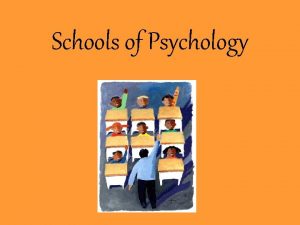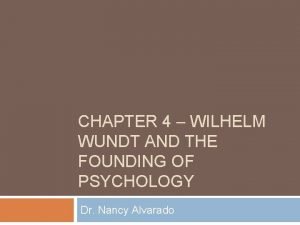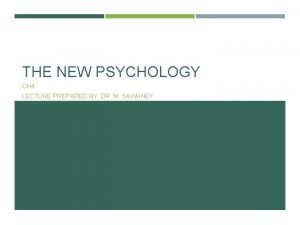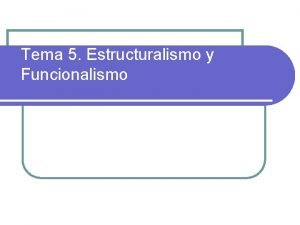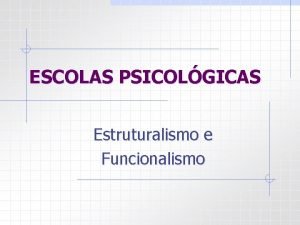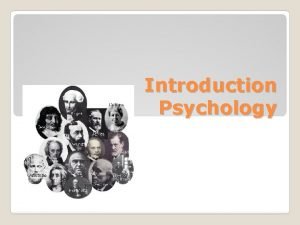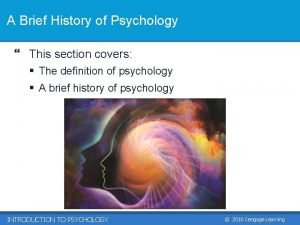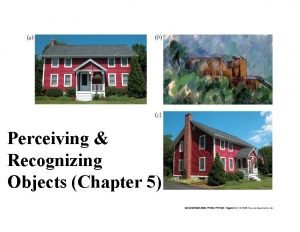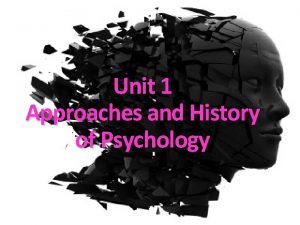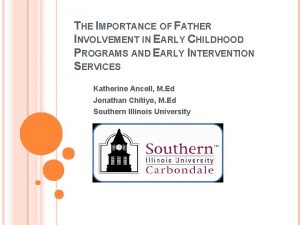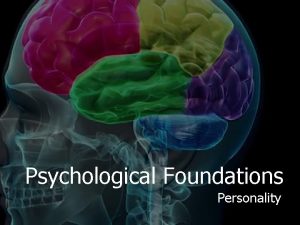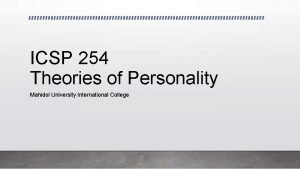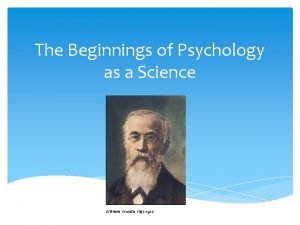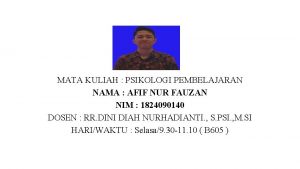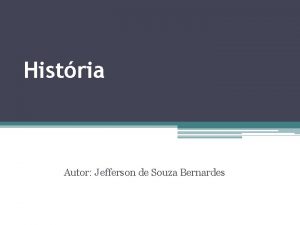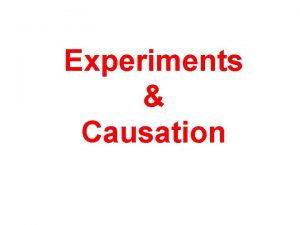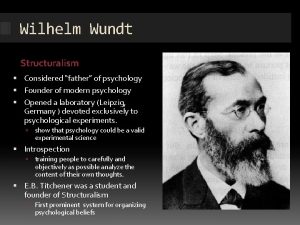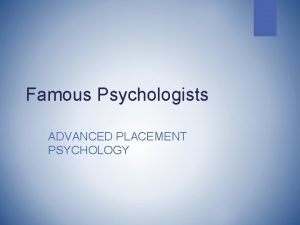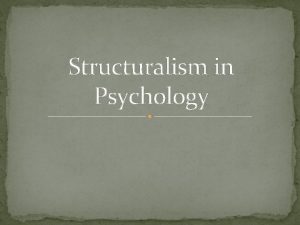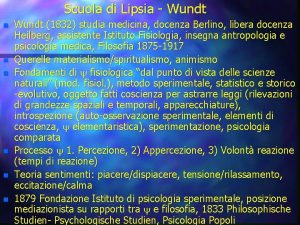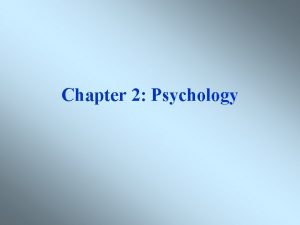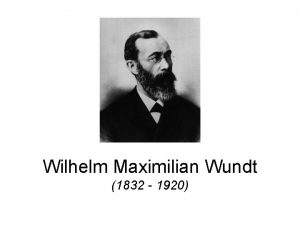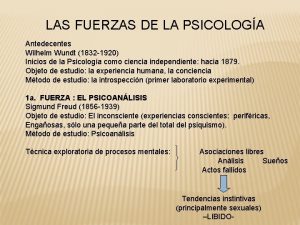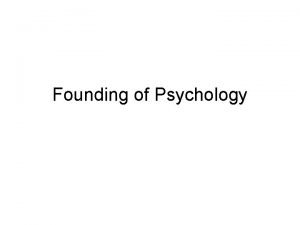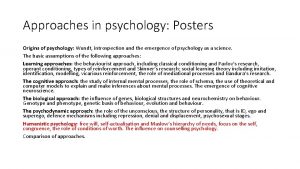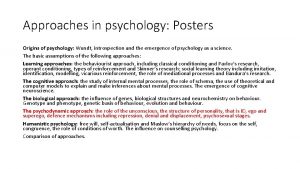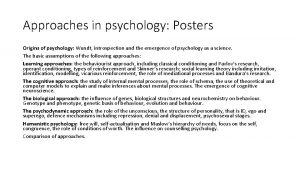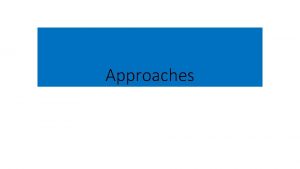Early Psychologists Wilhelm Wundt Father of Psychology German


























- Slides: 26

Early Psychologists Wilhelm. Wundt- “Father” of Psychology, German, opened first laboratory- first one to set forth that psychology was a science E. B. Titchener – Wundt’s student Structuralism (theory that thoughts and sensations determine conscious experiencesso an understanding of how the brain works leads to an understanding of consciousness)

Early Psychologists William James – First American Psychologist wrote the 1 st textbook, established Functionalism- theory focused on the ways consciousness helps people adapt to their environment. Sigmund Freud – first complete theory of personality- “psychoanalytic perspective” theory that personality/behavior comes from unconscious drives/conflicts and relied on personal observation and reflection not experimentation.

Early Psychologists Ivan Pavlov- Russian, studied animal learning – inspired a push towards observable behavior instead of reflective self-examination – famous for his dog experiment. John B Watson- Did not put much stock in the unconscious or invisible processes, founded “behaviorism”-the study of observable and objective acts and how people learn. B. F. Skinner- also a behaviorist but now they combine a study of observable behavior AND unseen mental processes.

Early Psychologists Abraham Maslow and Carl Rogers – Humanist psychologists, emphasized conscious experiences and free will- believed that all humans want to be the best they can be in their situations and rejected the idea of reward and reinforcements

Thinking Like a Psychologist • Understand that “common sense” and long-held beliefs are often imprecise • Psychologists use critical thinking and evidence to draw more accurate conclusions

Critical Thinking • The ability to – Reflect – Evaluate – Compare – Analyze – Critique – Synthesize • Requires an open mind a willingness to admit you’re wrong


Our Perspective is the key of our interpretation. There are 6 classic Schools (Perspectives) of Psychology -Biological -Sociocultural -Behavioral -Humanistic -Cognitive -Psychodynamic Psychologists from these different schools use their preferred framework to examine, analyze and determine the why behind the observed behavior. They are not exclusive and many psychologists will use a combination of the schools within one scenario.

The Outrageous Celebrity—Dennis Rodman • Behaviors Cursing in public and on live t. v. Cross-dressing A plethora of piercings and tattoos Frequently changing hair styles and colors ▫ Temper tantrums ▫ ▫ � Head-butting referee � Kicking a cameraman in the groin ▫ Dated Madonna ▫ Arrested for felony domestic violence; no contest to misdemeanor spousal battery charges ▫ He’s buddies with Kim Jong-Un

Why? • Biological ▫ Maybe he has a high level of estrogen/low testosterone that brings out his feminine side

Why? • Behavioral ▫ Maybe his father and grandfather frequently dyed & designed their hair. Dennis OBSERVED (learned) this throughout his life (they were his male role models) and he is now imitating the same behaviors.

Why? • Cognitive ▫ Maybe he THINKS his role in the NBA is to bring attention to his team in the media. His temper tantrums gets the team the attention it needs (and it pays off with big profits! It sells tickets!)

Why? • Social-cultural ▫ Is it really that unusual for celebrity CULTURE? These sorts of outrageous behaviors occur often “in Hollywood” and are widely accepted

Why? • Humanistic ▫ DR has low self esteem and lacks a sense of belonging. Traveling to North Korea to hang out with Kim Jong Un gives him a sense of meaningfulness in his life. ▫ …. the former basketball star, returned Tuesday to North Korea, where he said he planned to see “my friend” Kim Jong-un, the dictator whose country until recently was threatening to annihilate the United States with nuclear weapons

Why? • Psychodynamic ▫ Maybe he was physically abused by his father. Being violent and scaring people gives him a sense of control that he never felt as a child. Now it’s your turn…

Six Schools Practice Quiz

ABCD • Kate signed up for a psychology class at high school because she is most interested in investigating the unique ways different people think about and interpret life experiences. – A. behavioral – B. cognitive – C. psychoanalytic – D. Evolutionary

ABCD • Dr. Barr attributes the criminal behaviors of many teens to the pressures associated with being members of street gangs. – A. psychoanalytic – B. cognitive – C. social-cultural – D. humanistic

ABCD • Mrs. Weber believes that her son learned to play the tuba because she consistently rewarded his efforts to learn with praise and affection. – A. behavioral – B. humanistic – C. psychoanalytic – D. cognitive

ABCD • Professor Zember believes that most women prefer tall and physically strong partner because this preference enhanced the reproductive success of our female ancestors – A. behavioral – B. social cultural – C. evolutionary – D. psychoanalytic

ABCD • Sally has become the class clown because she doesn’t feel like she fits in with her peers and when they laugh with her she feels like she belongs. – A. biological – B. social cultural – C. behavioral – D. humanistic

ABCD • John doesn’t get along well with female teachers because of hidden conflict with his mother. – A. humanistic – B. behavioral – C. psychodynamic – D. cognitive

ABCD • John Nash suffered from schizophrenia due to abnormally high levels of dopamine in this brain. – A. cognitive – B. biological – C. social cultural – D. psychodynamic

ABCD • A psychologist interested in increasing psychology’s scientific knowledge base is doing ________ research. – A. Applied – B. Investigative – C. Basic – D. Difficult

ABCD • What is the main difference between clinical psychologists and academic psychologists? A. clinical psych. conduct basic research; academic psych. conduct applied research B. clinical psych. are MDs; academic psych. are Ph. Ds C. Clinical psych. diagnose and treat patients; academic psychologists conduct research D. Clinical psych. never do research and academic psychologists always do

Positive Psychology Focuses on building a better person- not repairing a damaged one. How can we create an environment and conditions that allow for people and communities to thrive? <iframe src="https: //embedssl. ted. com/talks/martin_seligman_on_the_state_of_psycho logy. html" width="640" height="360" frameborder="0" scrolling="no" webkit. Allow. Full. Screen mozallowfullscreen allow. Full. Screen></iframe>
 Structuralism in psychology definition
Structuralism in psychology definition Wundt contribution to psychology
Wundt contribution to psychology Wilhelm wundt childhood
Wilhelm wundt childhood Estructuralismo y funcionalismo
Estructuralismo y funcionalismo Estruturalismo e funcionalismo
Estruturalismo e funcionalismo Wilhelm wundt estruturalismo
Wilhelm wundt estruturalismo What is psychology
What is psychology Sports psychologist
Sports psychologist History of psychology summary
History of psychology summary Voluntarism definition psychology
Voluntarism definition psychology Gestalt law of familiarity
Gestalt law of familiarity Structuralist approach in language testing
Structuralist approach in language testing Approaches to psychology
Approaches to psychology German psychologists
German psychologists German psychologists
German psychologists Low german vs high german
Low german vs high german Early cpr and early defibrillation can: *
Early cpr and early defibrillation can: * Banked fire blaze
Banked fire blaze Father involvement in early childhood
Father involvement in early childhood Wundt personality
Wundt personality Algı nedir
Algı nedir Wundt personality
Wundt personality Willhelm wundt
Willhelm wundt Motif berasal dari bahasa inggris yang berarti
Motif berasal dari bahasa inggris yang berarti Voluntarisme wundt
Voluntarisme wundt Repudio positivista de wundt
Repudio positivista de wundt Wundt wiki
Wundt wiki
